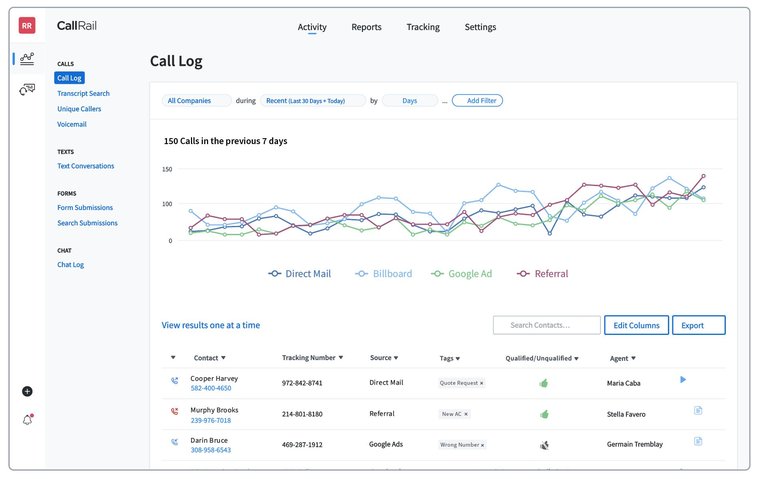If you're in the home improvement industry, you know how important it is to stay up-to-date with marketing trends. With so many options available, it can be tough to know which strategies will work best for your business. In this article, we'll explore some of the most effective marketing techniques for home improvement businesses.
One of the first things you need to do is establish your brand. This means creating a clear message that communicates who you are and what you offer. Your brand should be consistent across all marketing channels, from your website to your social media profiles. By creating a strong brand, you'll be able to stand out from the competition and build trust with potential customers.
Utilizing CallRail's Call Tracking for effective marketing analysis
As a home improvement business owner, you know that marketing is crucial to the success of your business. But how do you know if your marketing efforts are paying off? That's where CallRail's call tracking solution comes in.

With CallRail's call tracking, you can track the source of incoming calls to your business. This allows you to see which marketing campaigns are driving the most calls and which ones are falling short. By analyzing this data, you can make informed decisions about where to allocate your marketing budget for maximum impact. CallRail also offers features like:
- Dynamic number insertion: This technology replaces phone numbers on your website with unique tracking numbers for each visitor, allowing you to determine the specific marketing source that drove the call.
- Keyword-level tracking: Discover which keywords are most effective in driving calls, enabling you to fine-tune your search engine marketing strategy.
- AI call recording and transcriptions: Listen to recorded calls and read transcriptions for deeper insights into customer interactions, helping you improve your customer service and sales processes.
- Form tracking: Keep track of all of the forms on your website.
- Text messages: Create and send text messages to your customers all in one place.
But call tracking isn't just about measuring the success of your marketing campaigns. It can also help you understand the customer journey. By analyzing call data, you can see which pages on your website are driving the most calls and which ones need improvement. You can also see which keywords are driving calls and adjust your SEO strategy accordingly.
In addition, call tracking can help you refine your advertising strategies. By analyzing call data, you can see which ads are driving the most calls and which ones are not performing well. You can also see which times of day are the busiest and adjust your ad schedule accordingly.
Understanding your audience: The cornerstone of effective marketing
Knowing your audience is critical to creating a successful marketing strategy. You need to understand their needs, preferences, and pain points to tailor your messaging and offer solutions that resonate with them.
When it comes to home improvement, there are two main types of customers: DIY enthusiasts and homeowners looking for professionals. DIY enthusiasts are typically more budget-conscious and value-oriented. They enjoy the challenge of doing things themselves and take pride in their work. They are also more likely to research products and techniques online before making a purchase.
On the other hand, homeowners looking for professionals are more likely to prioritize convenience and quality over cost. They may not have the time, skills, or desire to tackle home improvement projects on their own and are willing to pay for professional help. They also tend to rely more on word-of-mouth recommendations and online reviews when choosing a contractor.
To effectively market to these two types of customers, you need to adjust your messaging and tactics accordingly. For DIY enthusiasts, focus on the affordability, ease of use, and versatility of your products. Provide detailed instructions and tutorials that demonstrate how to use your products effectively. For homeowners looking for professionals, emphasize the quality, reliability, and expertise of your services. Highlight your credentials, certifications, and testimonials from satisfied customers.
Digital marketing strategies for home improvement
Having a strong online presence is crucial for any business, including home improvement businesses. Here are some effective digital marketing strategies to help you grow your business:
1. A well-designed website
Your website is often the first impression potential customers will have of your business. It's important to make sure it's well-designed, easy to navigate, and showcases your work effectively. Make sure to include clear call-to-actions, such as "Request a Quote" or "Schedule a Consultation", to encourage visitors to take action. Also, having a portfolio of your previous work can help build trust and credibility with potential customers.
2. Social media platforms
Social media platforms like Instagram and Pinterest are becoming increasingly popular for showcasing home improvement work. These platforms allow you to visually showcase your work and connect with potential customers. Make sure to use high-quality images and engaging captions to grab people's attention.
3. Search engine optimization (SEO)
SEO is the process of optimizing your website to rank higher in search engine results pages (SERPs). This can help increase your visibility and drive more traffic to your website. Some effective SEO strategies include keyword research, optimizing your website's content and metadata, and building backlinks from reputable sources.
4. Pay-per-click (PPC) advertising
PPC advertising allows you to place ads on search engine results pages and other websites, paying only when someone clicks on your ad. This can be an effective way to drive traffic to your website and generate leads. Make sure to target your ads to the right audience and use engaging ad copy to encourage clicks.
SEO: The blueprint of online visibility
If you want your home improvement business to succeed online, you need to make sure that potential customers can find your website easily. This is where Search Engine Optimization (SEO) comes in. SEO is the process of optimizing your website and its content to rank higher in search engine results pages (SERPs).
To optimize your website for search engines, you need to focus on several key areas. First, you need to conduct keyword research to identify the words and phrases that potential customers are using to search for home improvement services. Once you have identified these keywords, you need to incorporate them into your website's content, including your page titles, meta descriptions, and body copy.
Another important aspect of SEO is local optimization. This involves optimizing your website for local search queries, such as "home improvement services near me." To do this, you need to ensure that your business's name, address, and phone number (NAP) are consistent across all online directories and platforms. You should also create local content that targets your specific geographic area.
Finally, you need to make sure that your website's content is relevant and useful to potential customers. This means creating high-quality content that answers common questions and addresses common pain points in the home improvement industry. You should also use semantically related keywords throughout your content to help search engines understand the context of your pages.
Content marketing: Sharing your craftsmanship journey
Sharing your craftsmanship journey through content marketing can help you connect with potential customers and build trust. By showcasing your expertise, creativity, and attention to detail, you can demonstrate the value of your services and inspire people to choose your business over competitors.
One effective way to share your craftsmanship journey is through before-and-after transformations. By showing how you can turn a dated, worn-out space into a beautiful, functional one, you can demonstrate your ability to create real value for your clients. Make sure to include high-quality photos and detailed descriptions of the process to help potential customers understand the work involved.
Another great idea for content is DIY tips. By sharing your knowledge and expertise, you can establish yourself as a trusted authority in the industry. Consider creating how-to videos, blog posts, or social media posts that offer practical advice on everything from choosing the right materials to tackling common home improvement challenges.
Customer testimonials are also a powerful tool for content marketing. By featuring satisfied customers who have worked with your business, you can provide social proof of your expertise and reliability. Make sure to include quotes, photos, and videos that showcase the positive impact your services have had on people's lives.
Overall, content marketing is an essential part of any successful home improvement business. By sharing your craftsmanship journey through before-and-after transformations, DIY tips, and customer testimonials, you can establish yourself as a trusted authority in the industry and inspire people to choose your business over competitors.
Partnerships and collaborations: Building bridges in the community
Collaborating with local businesses and influencers isa powerful way to build your brand and reach new customers. By partnering with other companies in your community, you can tap into their customer base and gain exposure to new audiences.
One effective way to build partnerships is to identify businesses that complement your own. For example, a home renovation company might partner with a local home decor store to offer joint promotions or discounts. By working together, both businesses can benefit from increased exposure and sales.
Another approach is to collaborate with local influencers or bloggers who have a strong following in your community. These individuals can help promote your brand and products to their audience, giving you access to a wider reach than you might have on your own.
Case studies have shown that successful partnerships can lead to significant business growth. For example, a home improvement company in a small town partnered with a local hardware store to offer a joint promotion. The promotion was promoted on social media and in-store signage, and resulted in a 20% increase in sales for both businesses.
In another case, a home renovation company partnered with a popular home decor blogger to showcase their work on her blog and social media channels. The blogger's followers were highly engaged with the content, leading to increased traffic and sales for the renovation company.
By building partnerships and collaborating with others in your community, you can create a powerful network that helps to build your brand and grow your business.
Customer reviews: The sealant of trust
As a home improvement business owner, you know that word of mouth can make or break your reputation. Customer reviews are a powerful tool to build trust with potential clients and establish yourself as a reliable and skilled professional.
Encouraging happy customers to leave reviews is essential to building a solid online reputation. Make it easy for them by providing links to your business profiles on popular review sites like Yelp, Google My Business, and Facebook. Consider offering incentives such as discounts or free services to customers who leave a review.
Negative reviews can be a challenge, but they can also be an opportunity to showcase your professionalism. Respond to negative reviews promptly and respectfully. Address the customer's concerns and offer a solution or compensation if appropriate. This shows potential clients that you care about your customers and are willing to go the extra mile to make things right.
Remember, customer reviews are the sealant of trust in the home improvement industry. By encouraging happy customers to leave reviews and handling negative reviews with professionalism, you can build a strong online reputation and attract more clients to your business.
Conclusion
Home improvement marketing is a crucial aspect of any business that deals with home renovations and repairs. A well-executed marketing strategy can help you reach your target audience, increase brand awareness, and ultimately boost sales.
To ensure the success of your marketing efforts, it is essential to understand your target audience and tailor your messaging to their needs and preferences. By following these best practices and staying up-to-date with the latest marketing trends and technologies, you can create a successful home improvement marketing strategy that drives growth and profitability for your business.








